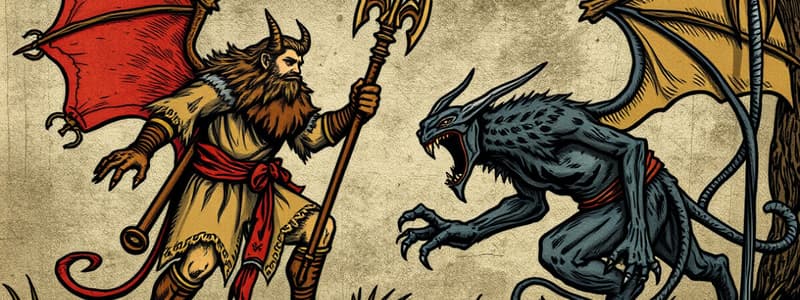Podcast
Questions and Answers
What does the narrator describe Grendel as?
What does the narrator describe Grendel as?
- A demon and a fiend (correct)
- A brave knight
- A servant of God
- A noble creature
Who is said to be protected by God in relation to Grendel?
Who is said to be protected by God in relation to Grendel?
- The Danish Watchman
- Beowulf
- Unferth
- King Hrothgar (correct)
Who commanded a boat to help King Hrothgar?
Who commanded a boat to help King Hrothgar?
Beowulf
What does Hrothgar plan to do for Beowulf?
What does Hrothgar plan to do for Beowulf?
Beowulf wishes to fight Grendel with his ______.
Beowulf wishes to fight Grendel with his ______.
What does Unferth challenge Beowulf about?
What does Unferth challenge Beowulf about?
What does Beowulf express about Grendel comparing to himself?
What does Beowulf express about Grendel comparing to himself?
The narrator claims God's help was with the Geats against Grendel.
The narrator claims God's help was with the Geats against Grendel.
What does Hrothgar say about pride?
What does Hrothgar say about pride?
Beowulf states, 'I've never known ______.'
Beowulf states, 'I've never known ______.'
What did Beowulf do before engaging in battle?
What did Beowulf do before engaging in battle?
Study Notes
Grendel's Nature and Origins
- Grendel is described as a demon and fiend, haunting the moors and born of the murderous lineage of Cain.
- He embodies the evil that opposes God’s will, having been banished and punished for his crimes against humanity.
Grendel’s Terror
- Despite living in Herot, Grendel avoids King Hrothgar's throne, protected by divine influence, showing his fear of God.
Beowulf's Resolve
- Beowulf, the strongest of the Geats, learns of Grendel's havoc and decides to assist Hrothgar by travelling across the sea, showcasing his bravery and duty.
Danish Watchman's Perspective
- The watchman emphasizes the distinction between words and actions, indicating the values of honor and integrity in battle.
Hrothgar's Gratitude
- Hrothgar recognizes Beowulf as a divine sign meant to free them from Grendel's terror and vows to reward his courage with treasures upon his arrival.
Beowulf’s Combat Strategy
- Beowulf requests to fight Grendel unarmed, believing he can defeat the creature without weapons, relying solely on his strength and faith in God.
Unferth’s Challenge
- Unferth expresses skepticism about Beowulf’s chances against Grendel, hinting at the dangers of the impending battle.
Beowulf's Purpose and Fate
- Beowulf declares his intent to earn glory or die fighting Grendel, showing a sense of duty toward legacy and honor in life and death.
Beowulf's Confidence
- He asserts he possesses equal or greater bravery and strength than Grendel and chooses not to use a sword, believing it would diminish the challenge.
Divine Favor in Battle
- Narration reveals that God’s favor aids the Geats, hinting at a divine control over the outcomes of earthly struggles.
Acknowledgment of Divine Power
- Hrothgar expresses gratitude for God’s intervention, voicing that they have endured too long under Grendel's wrath, which reflects on the theme of divine providence.
Fate and Human Agency
- The narrator contemplates the inevitability of fate being governed by God, illustrating humanity's limited control over their destinies.
Welthow’s Blessing
- Welthow gifts Beowulf with jewels as a token of gratitude, showing respect and recognition of his bravery while encouraging him to continue his legacy.
Reflections on Fate and Strength
- The narrative emphasizes how Beowulf, relying on God’s strength, ultimately succeeds in defeating the monster as it was meant to be, illustrating the theme of fate.
Calls for Avenging Friends
- Beowulf encourages Hrothgar to act against their enemies instead of wallowing in grief, promoting the idea that seeking glory and revenge is honorable.
Beowulf's Fearlessness
- The narrative highlights Beowulf's courage when he chooses to face a terrifying lake monster, contrasting his bravery with Unferth’s cowardice.
Fame and the Pursuit of Glory
- Beowulf’s desire for fame drives him into battle, epitomizing the warrior ethos of striving for honor and legacy.
Hrothgar’s Recognition of Bravery
- Hrothgar praises Beowulf’s greatness, recognizing his wise and heartful approach to fame, which reflects the values of leadership and respect.
Reflection on Mortality
- Hrothgar philosophizes about God’s gifts and the fleeting nature of power, urging caution against pride amid success.
Themes of Humility and Pride
- Hrothgar advises against pride and emphasizes the importance of humility, reinforcing moral lessons within the narrative.
Deep Emotions and Heavy Hearts
- The narrator conveys emotional depth through expressions of sorrow and the weight of duty, implying the inner struggles of warriors.
Courage in the Face of Fear
- Beowulf boldly states his lack of fear before battle, showcasing his character as a heroic figure steadfast in his convictions.
The Significance of Weapons
- Beowulf’s vow to confront challenges without conventional weaponry underscores his belief in personal strength and resolve over mere tools.
Importance of Comradeship
- The narrative depicts scenes of camaraderie, emphasizing loyalty and support among warriors even in dire situations.
Legacy of Beowulf
- Wiglaf refers to Beowulf as beloved, foreshadowing his lasting legacy and hinting at the importance of mentorship and connection in heroism.
Beowulf's Perception of Legacy
- As the story progresses, Beowulf reflects on being the last of his kin, marking the significance of legacy and the cycle of life in epic tales.
Studying That Suits You
Use AI to generate personalized quizzes and flashcards to suit your learning preferences.
Description
Explore the complexities surrounding Grendel's origins and his role as the embodiment of evil in the epic poem Beowulf. Learn about Beowulf's courageous resolve to confront Grendel, the dynamics of honor in battle, and Hrothgar's recognition of Beowulf's efforts. This quiz covers key themes and characters from the text.



